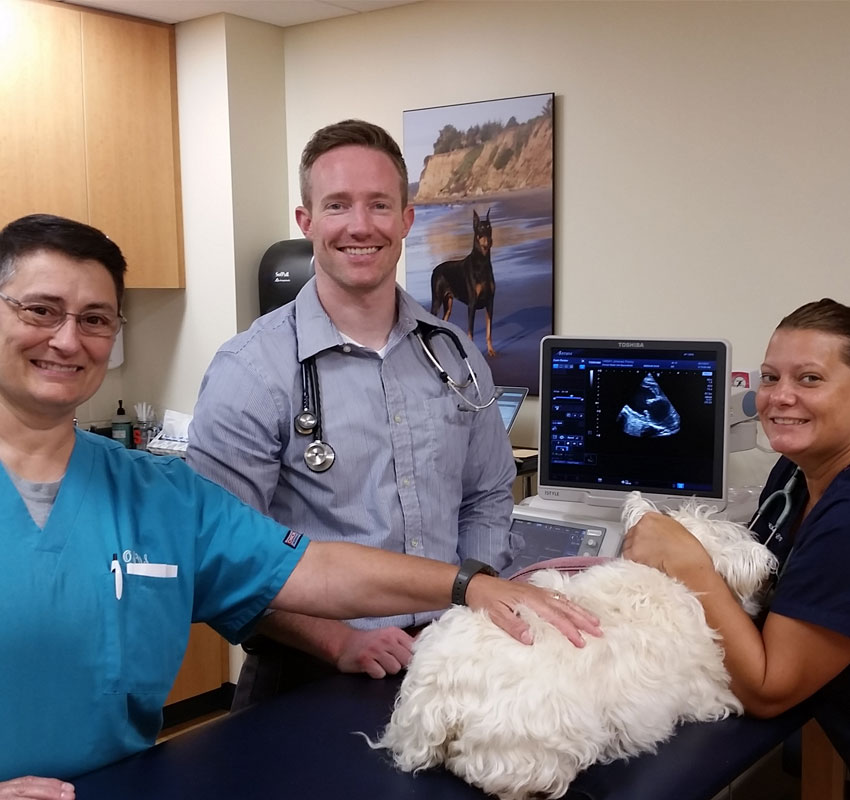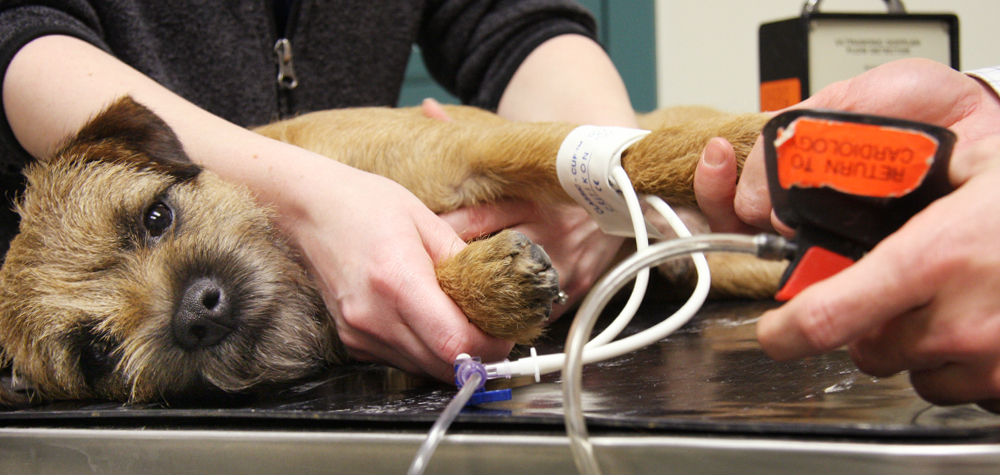Discovering the Important Solutions Offered by a Vet Cardiologist: Recognizing Ultrasound and CT Scan Techniques
Vet cardiologists play an important role in the wellness of family pets by detecting and dealing with different heart disease. They utilize advanced imaging strategies, such as heart ultrasound and CT scans, to supply precise assessments. Each technique has its distinct benefits and applications. Comprehending these techniques is essential for pet dog owners seeking the ideal take care of their companions. What variables should family pet owners take into consideration when selecting between these analysis tools?

The Function of Vet Cardiologists in Pet Healthcare
Veterinary cardiologists play an essential function in the health care of pet dogs, concentrating particularly on diagnosing and dealing with heart-related problems. They possess specialized training that enables them to translate complicated analysis examinations and recognize numerous cardio problems. These professionals utilize advanced techniques, such as echocardiography and electrocardiography, to assess heart feature and framework accurately.Veterinary cardiologists additionally create customized treatment plans that might include medications, way of living alterations, and, in many cases, medical treatments. Their experience includes enlightening family pet proprietors concerning heart wellness, highlighting the significance of routine check-ups and early discovery of possible issues. Cooperation with general veterinarians is essential, as it guarantees thorough treatment for family pets with thought cardiac concerns. By using specialized services, veterinary cardiologists considerably enhance the quality of life for pet dogs and supply assurance for their proprietors, strengthening the significance of heart health in total animal wellness.
Usual Heart Problems in Pets
Usual cardiac concerns in animals can greatly influence their health and wellness and lifestyle. Heart whisperings, different sorts of cardiomyopathy, and hereditary heart flaws are among one of the most prevalent problems that veterinarians run into. CT Scans For Animals. Comprehending these concerns is important for family pet proprietors to ensure prompt diagnosis and proper therapy
Heart Murmurs in Pets
Although heart whisperings can be a resource of issue for pet owners, they are not always a measure of major health issues. A heart whispering is an abnormal noise created by stormy blood circulation within the heart. In animals, these murmurs can be triggered by numerous elements, consisting of genetic heart defects, valve problems, and even stress and anxiety throughout examinations. Several pet dogs with heart murmurs lead typical lives without considerable health and wellness influences. To establish the underlying reason, vet cardiologists frequently utilize analysis methods such as echocardiograms and Doppler ultrasounds. Early discovery and evaluation are necessary, as they might aid take care of any potential cardiac issues properly. Pet dog proprietors are urged to consult their vet for a thorough evaluation if a heart whispering is found.
Cardiomyopathy Types Explained
Cardiomyopathy includes a group of diseases impacting the heart muscle mass, resulting in endangered heart function in animals. The most usual kinds consist of expanded cardiomyopathy (DCM), hypertrophic cardiomyopathy (HCM), and restrictive cardiomyopathy (RCM) DCM mainly affects dogs, creating the heart to compromise and expand, which decreases its ability to pump blood effectively. In comparison, HCM is a lot more prevalent in cats, identified by the thickening of the heart walls, usually causing obstructed blood flow. RCM, though much less typical, occurs when the heart muscle comes to be stiff, restricting its capability to fill up with blood. Each kind offers distinct difficulties in medical diagnosis and therapy, requiring specialized veterinary cardiological analysis to ensure peak management and look after affected pet dogs.
Hereditary Heart Issues
Hereditary heart defects stand for a significant group of cardiac problems in pets, distinctive from acquired conditions such as cardiomyopathy - Board Certified Veterinary Cardiologist. These issues are structural problems present at birth, impacting the heart's regular function. Usual types include license ductus arteriosus, ventricular septal defects, and pulmonic stenosis. Signs and symptoms may vary extensively, ranging from moderate to serious, and can consist of workout intolerance, coughing, and difficulty breathing. Early medical diagnosis via advanced imaging techniques like ultrasound is necessary for effective monitoring. Vet cardiologists play an essential duty in recognizing these conditions and suggesting proper therapy options, which may include clinical monitoring or medical treatment. Recognizing hereditary heart flaws permits for far better end results and boosted lifestyle for affected animals
Comprehending Heart Ultrasound: Just How It Functions
A substantial number of veterinary methods currently make use of heart ultrasound as an essential diagnostic tool for evaluating heart health in animals. This non-invasive technique uses high-frequency acoustic waves to develop images of the heart's framework and feature. Throughout the treatment, a veterinary technician applies a gel to the animal's chest and uses a transducer to give off ultrasound waves. These waves bounce off the heart and surrounding structures, creating real-time photos on a monitor.Veterinarians can analyze numerous aspects of cardiac health, consisting of chamber dimension, wall surface movement, and shutoff feature. Furthermore, cardiac ultrasound permits the discovery of problems such as liquid build-up and congenital heart defects. This strategy is essential for identifying problems that might not show up through typical radiographs. By giving in-depth info about the heart's makeup and efficiency, cardiac ultrasound aids in formulating reliable treatment plans for pets experiencing cardiovascular disease.
The Significance of CT Checks in Diagnosing Heart Conditions
Just how do CT scans boost the medical diagnosis of heart problems in veterinary medicine? CT scans give thorough cross-sectional photos of the heart and surrounding frameworks, allowing vets to imagine complex physiological connections. This imaging technique is particularly advantageous in recognizing hereditary heart problems, heart tumors, and problems in blood vessels. By making use of advanced imaging formulas, CT scans can assess heart chamber dimensions and function, using a comprehensive sight that might be challenging to attain with conventional methods.Additionally, CT angiography can imagine blood circulation and identify locations of stenosis or obstruction, which is crucial for preparing possible interventions. The speed and accuracy of CT scans additionally help with quick medical diagnoses, vital in emergency scenarios. Ultimately, the unification of CT scans right into vet cardiology substantially enhances the accuracy of medical diagnoses, enabling targeted treatment strategies and enhancing person outcomes for animals dealing with heart conditions.
Comparing Ultrasound and CT Check Methods
While both ultrasound and CT scans are vital devices in veterinary cardiology, they offer distinct advantages and constraints that affect their usage in diagnosing heart disease. Ultrasound, or echocardiography, offers real-time imaging of the heart's structure and function, enabling veterinarians to evaluate heart chambers, shutoffs, and blood circulation. It is especially reliable for reviewing conditions like congestive heart failure and cardiomyopathy. Nevertheless, ultrasound might be limited in imagining specific physiological frameworks as a result of patient size or obesity.In contrast, CT scans offer in-depth cross-sectional photos of the heart and bordering cells, making them ideal for identifying structural problems, lumps, or vascular concerns. CT scans provide extensive understandings, they need sedation and may entail radiation direct exposure. Ultimately, the choice in between ultrasound and CT scans relies on the certain medical circumstance, the individual's problem, and the info needed for an exact diagnosis.
Therapy Choices Available Via Vet Cardiology
Vet cardiology supplies a variety of therapy alternatives tailored to resolve different heart disease in animals. Treatment strategies commonly begin with way of my response living modifications, consisting of diet modifications and exercise changes, targeted at improving total heart health. Drugs play a vital function, with cardiologists suggesting medications such as diuretics, beta-blockers, and ACE preventions to boost and handle symptoms cardiac function.In a lot more severe cases, interventional treatments, such as balloon valvuloplasty or stent placement, might be required to ease blockages or enhance blood circulation. For certain hereditary heart issues, medical alternatives may be discovered to fix architectural issues. Additionally, continuous tracking and follow-up treatment are essential components of a complete therapy plan, enabling timely modifications based upon the animal's feedback to treatment. Overall, veterinary cardiology concentrates on providing effective, personalized like maximize the health and well-being of animal patients with heart disease.
How to Prepare Your Animal for a Heart Analysis
Preparing a pet for a heart analysis is necessary to ensure precise results and a smooth process. Owners ought to initially arrange the consultation with the vet cardiologist and review any kind of certain needs or problems. It news is advisable to withhold food for at the very least 12 hours prior to the evaluation, as this aids boost imaging high quality during procedures like ultrasound or CT scans.Additionally, preserving a tranquil environment on the day of the consultation can aid reduce the pet's anxiousness. It is valuable to bring along any type of appropriate medical records, including previous tests and medications (Board Certified Veterinary Cardiologist). Owners should additionally make certain that their family pet is comfy and leashed during transport to the facility. Lastly, acquainting themselves with the examination process can help and minimize worries in asking notified questions throughout the assessment. By complying with these steps, proprietors can contribute substantially to the efficiency of the cardiac evaluation
Regularly Asked Questions
How much time Does a Cardiac Ultrasound or CT Scan Take?
The duration of a heart ultrasound usually varies from 30 to 60 mins, while a CT scan might take approximately 15 to half an hour. Elements such as the client's condition can influence these time quotes.

Exist Any Kind Of Risks Connected With These Analysis Procedures?

Can I Stick With My Pet Dog Throughout the Treatment?
The vet facility's policy typically determines whether pet dog owners can stay during procedures. While some clinics encourage proprietor presence for comfort, others may require splitting up to assure safety and security and suitable conditions for analysis imaging.
Just how much Do These Analysis Examinations Commonly Cost?
The costs of diagnostic examinations, such as ultrasound and CT scans, normally differ based on area and facility. Typically, rates range from a couple of hundred to over a thousand bucks, mirroring the intricacy and modern technology included.
What Is the Recuperation Refine After a Heart Analysis?
The healing process after a heart assessment involves checking the family pet for any kind of prompt reactions, making sure comfort, and restricting physical task. Vets normally supply post-evaluation directions to direct animal proprietors throughout this necessary healing period. Heart whisperings, different kinds of cardiomyopathy, and hereditary heart problems are among the most prevalent conditions that vets experience. A heart murmur is an uncommon noise created by rough blood circulation within the heart. Cardiomyopathy encompasses a group of conditions impacting the heart muscle, leading to jeopardized cardiac function in pet dogs. Genetic heart defects represent a considerable category of heart issues in family pets, distinct from gotten conditions such anchor as cardiomyopathy. Ultrasound, or echocardiography, provides real-time imaging of the heart's framework and function, enabling vets to assess heart chambers, shutoffs, and blood circulation.